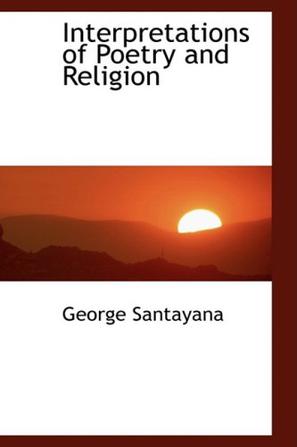
George Santayana《Interpretations of Poetry and Religion》
书刊介绍
INTERPRETATIONS POETRY AND RELIGION -- PREFACE -- THE following volume is composed of a number 3f papers written at various times and already partially printed they are now revised and gathered together in the hope that they may lead the reader, from somewhat different points of approach, to a single idea. This idea is that religion and poetry are identical in essence, and differ merely in the way in which they are attached to practical affairs. Poetry is called refigion when it intervenes in life, and religion, when it merely supervenes upon life, is seen to be nothing but poetry. It would naturally follow from this conception that religious doctrines would do well to withdraw their pretension to be dealing with matters of fact. That pretension is not only the source of the confiicta of religion with science and of the vain and bitter controversies of sects it is also the cause of tihe impurity and incoherence of religion in the soul, when it seeks its sanctions in the sphere of reality, and forgets that its proper concern is to express the ideal. For the dignity of religion, like that of poetry and of every moral ideal, lies pre eisely in its ideal adequacy, in its fit rendering of v the meanings and values of life, in its anticipation of perfection so that the excellenue of religion is due to an idealization of experience which, while making religion noble if treated as poetry, makea it necessarily false if treated as science. Its fun tion is rather to draw from reality materials for an image of that ideal to which reality ought to conform, and to make us citizens, by anticipation, in the world we crave. It also follows from OIU general conception that poetry has a universal and amoral function. Its rudimentary essays in the region of fancy and pleasant sound, as well as its idealization of episodes in human existence, are only partial exercises in an art that has all time and all experience for its natural subjecbmatter and all the possibilities of being for its ultimate theme. As religion is deflected from its course when it is confused with a record of facts or of natural laws, so poetry is arrested in its development if it remains as un meaning play of fancy without relevance to the ideals and purposes of life. In that relevance lies ite highest power. As its elementary pleasantness comes from its response to the demands of the ear, so its deepest beauty comes from ite response to the ultimate demhds of the soul. This theory cm hardly hope for much commen dation either from the apologists of theology or from its critics. The mass of mankind ir divided into two classes, the Sancho Panzas who have a sense for reality, but no ideals, and the Don Quix-L otes with a sense for ideals, but mad. The expe dient of recognizing facts as facts and accepting ideals as ideals, - and this is d l we propose, - although apparently simple enough, seems to elude the normal human power of discrimination. If, therefore, the champion of any orthodoxy should be offended at our conception, which would reduce his artful cosmos to an allegory, all that could be said to mitigate his displeasure would be that our view is even less favourable to his opponents than to himself. The liberal school that attempts to fortify r e ligion by minimizing its expression, both theoretic and devotional, seems from this point of view to be merely impoverishing religious symbols and vulgarizingreligious aims it subtracts from faith that imagination by which faith becomes an interpretation and idealization of human life, and retains only a stark and superfluous principle of superstition...
相关推荐
-

图说论语
图说论语 本书特色 本书是全民普及国学的超时尚读本,经典阅读方法的*前沿体验。没有时间去阅读浩瀚的巨著?便携式的设计,随时随地翻开就读。没有精力去咀嚼古代的文字...
-

谈美
谈美 本书特色 《谈美》是朱光潜先生于1932年以书信形式为青年所写的一本美学入门书。本书是其经典代表作《文艺心理学》的“缩写本”,也是给青年的“第十三封信”(...
-

道教自然观研究
道教自然观研究 本书特色 中国道教研究在百年的历程中,走过的并不是一条平坦的路。整个20世纪,经历了中西多元文化的激烈冲撞、一元文化的范式转化、全球化背景下多元...
-

雍文昴《从妙物入妙悟》
本書主要通過對魏晉南北朝時期顧愷之、宗炳以及王微的生平與交遊狀況之梳理,以考察這三位畫論家與其同時代人物在思想上相互切磋
-

西方哲学简史:面向21世纪课程教材
西方哲学简史 本书特色 我们选择的哲学问题是人类心灵思考的永恒问题,历史上和现实中的哲学家提出了一个又一个的答案,但一个接着一个被推翻、被修改、被重写。哲学史展...
-

道德情操论
道德情操论 本书特色 温家宝总理五次推荐的大师巨著。台湾著名学者、《国富论》译者谢宗林的权威全译本。温总理说:“亚当·斯密的《国富论》,各位都很熟悉,他所著的《...
-

一个古代公务员的沉思录
一个古代公务员的沉思录 本书特色 绝妙华章《千字文》无死角解读,1000个字,通晓古今,看天下,补上国学**课。一个古代公务员的沉思录 内容简介 读此书,您可以...
-

儒学与经学探微
儒学与经学探微 目录 论汉代谶纬神学廖平与经学的终结独尊儒术与西汉学术大势汉代经学博士考辨《左传》与《诗经》《左传》、《国语》与《易经》析《太玄》构架形式中国古...
-

汤姆·罗克摩尔《黑格尔:之前和之后》
本书欲为在所有时代堪称最重要的哲学家之一的那个人的思想作一个导引。黑格尔的理论,如同笛卡尔、康德以及其他一些哲学家的理论
-

尼采的政治哲学与美学
尼采的政治哲学与美学 本书特色 王维民著的《尼采的政治哲学与美学》是一本学术性较强的专著,以后现代理论对尼采思想的广泛征引为考察起点,强调尼采美学的政治哲学意蕴...
-

白话法华经
白话法华经 本书特色 《法华经》是流传*广的几都佛经之一,在中国以及整个东亚地区广为流传,盛行不衰。李利安注译的《白话法华经》在长期潜心研究的基础上,对《法华经...
-

中国神话大词典
中国神话大词典 本书特色《中国神话大词典》是中国各民族神话之集大成者,其内容分为两大部分,**部分为古籍记载,主要选收汉民族神话之见于古籍者,间收古籍记载中若干...
-

佛本是道.6
佛本是道.6 本书特色 2006-2008年无可比拟的仙侠巨著,为仙侠类玄纪小说开启出一扇全新的门户将中国古代神话历史与现代修真完美融合在一起的经典之作,网络人...
-

快乐学哲学-第5版-注释版
快乐学哲学-第5版-注释版 本书特色 《英文大学人文经典教材:快乐学哲学(注释版)》自1988年问世以来,一直受到业内的肯定和读者的欢迎,不断再版。难以理解的哲...
-

华夏出版社经典与解释赫西俄德的世界
华夏出版社经典与解释赫西俄德的世界 本书特色 本期为赫西俄德专题,选译了英语学界研究赫西俄德的四篇代表性文章,分别涉及赫西俄德诗歌与自然哲学和政治哲学的关系问题...
-
![[美] 玛里琳·鲁宾逊《基列家书》](http://oss.shudanhao.com/caiji/chazidian/2023/35371.jpg)
[美] 玛里琳·鲁宾逊《基列家书》
《基列家书是》“21世纪年度最佳外国小说”评选中2005年度美国文学入选作品。年事已高、来日无多的埃姆斯牧师给七岁的儿子写下这
-

承认.正义.伦理-实践哲学语境中的霍耐特政治伦理学
承认.正义.伦理-实践哲学语境中的霍耐特政治伦理学 本书特色 本书首先从广义和狭义两个角度理解“政治伦理学”,并对所讨论的“...
-

张君劢儒学著作集-儒学哲学之复兴
张君劢儒学著作集-儒学哲学之复兴 本书特色 本书收集了张君励在20世纪50——70年代发表的关于儒家哲学复兴的文章十篇。行文中对儒家文化传统与源于希腊罗马的西方...
-

洪汉鼎《现象学十四讲》
《现象学十四讲》认为,现象学最大的贡献,就在于使我们前哲学的生活、经验与思考获得正当有效性。对于我们这些受过近代科学启蒙
-

不朽圣像100-最后的晚餐
不朽圣像100-最后的晚餐 内容简介 *后的晚餐是*著名和为人所知的圣经故事。在逾越节的前夜,耶稣知道他被自己的门徒犹大出卖了,所以召集门徒一起共进*后的晚餐。...





